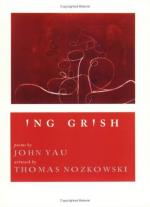|
This section contains 391 words (approx. 2 pages at 300 words per page) |

|
SOURCE: Sihjeldahl, Peter. “Cabin Fever.” Parnassus: Poetry in Review 9, no. 1 (spring-summer 1981): 294-95.
In the following excerpt, Sihjeldahl offers a favorable assessment of The Sleepless Night of Eugene Delacroix.
John Yau's intense, high-strung prose-poetry [in The Sleepless Night of Eugene Delacroix] makes use of the Borgesian conceit that pastness equals ancientness. This conceit is a remarkable survival of the pre-Romantic European “picturesque”—all those late-eighteenth-century pictures of overgrown ruins—given a second life in nineteenth-century popular literature and a third in the poetics of modernist lostness and irony. It has appealed particularly to sensibilities, like Borges', that are top-heavy with sophistication in cultures, like Argentina's, that are bottom-heavy with barbarity. Yau is Chinese-American, which, pending a denial from him, I choose to think germane somehow. He is very Borgesian indeed in pieces like “The Abandoned Observatory,” set in a Morocco of the mind inlaid with realistic detail. The best...
|
This section contains 391 words (approx. 2 pages at 300 words per page) |

|


